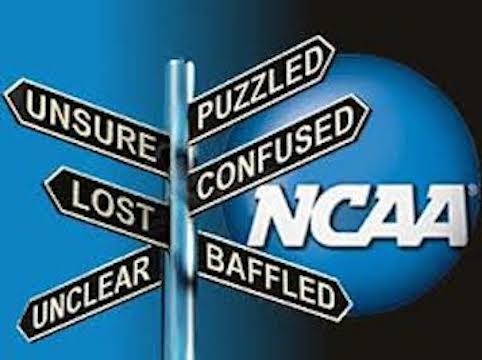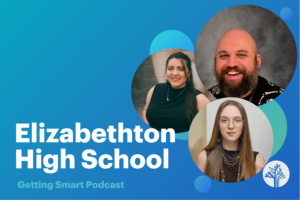NCAA Way Out of Bounds for Outlawing Online

It is outrageous that the NCAA is deciding what constitutes good instruction–specifically effective student-teacher interaction–and becoming a de facto national regulator of online learning. Thousands of student athletes are ineligible to compete in college because the NCAA took on a job where they had no business, they applied anachronistic measures, and–worst of all– they acted capriciously with a disappointing lack of transparency.
This spring, the NCAA declared that, after this school year, the coursework from 24 schools that use K12 curriculum—and often K12 teachers—will no longer be accepted toward the initial eligibility requirements.
Why? As Michael Horn explained, “It’s not entirely clear because the NCAA didn’t say explicitly; the NCAA staff determined that “several K12 schools/programs do not meet the requirements of NCAA non-traditional core course legislation.”
Arizona Attorney General Tom Horne said, “This decision raises issues relating to the regulation and oversight of Arizona public schools,” something “generally thought to be within the purview of the Arizona legislature, Department of Education, State Board for Charter Schools, and other duly established educational authorities.
Like Michael Horn, Tom Horne was “unable to locate any articulation of this standard, definition or other guidance as to what “regular interaction” mean, how it is measured, or what constitutes compliance.”
A response back to AG Horne from NCAA VP Todd Leyden said “the NCAA is careful not to generalize the value or legitimacy of nontraditional instruction.” But a few paragraphs later it said their review boils down to the nature and frequency of student-teacher interaction. Given the stellar academic results of NCAA athletes it’s interesting that they felt compelled to invent an input statistic that no accrediting or authorizing body uses–one that requires online learning providers to pull a set of proxy interaction statistics from their LMS. This stat is so arbitrarily applied that, for some students one semester of a course will be counted and another one will be rejected.
Leyden’s response alludes to a 2012 incident where a K12 staffer submitted data that contradicted a 2010 submission. This apparently pissed off NCAA staffer Nick Sproull, who immediately made 24 K12 schools Tier 2, which requires any athlete to submit detailed information on every course they took in high school. Then in the spring 2014, Sproull moved all K12 partner schools that had submitted courses for specific college-bound students to Tier 3–immediately making thousands of students ineligible for NCAA athletics. LIke Michael Horn, I’m not sure what went on behind the scenes, but K12 VP Mary Gifford said they’ve tried repeatedly to rectify the situation. The grudge continues–Sproull won’t talk to the banned school boards and won’t tell them how to remedy their athletic ineligibility. So much for “not generalizing.”
I’ve interviewed lots of online teachers (here’s 3 we spoke to in May) from K12 and other providers and I’ve looked at lots of online curriculum. My district opened the first K-12 online school in the country–I’ve been at this for 20 years. What really bothers me is that I don’t think nature and frequency of teacher interaction in a K12-powered school is substantially different than the 1,000 other programs that Leyden claims they have reviewed and approved. That leads me to conclude that, rather that a course review process, this is a retaliatory action applied to all the schools that work with a particular online learning provider–and that is disturbing.
To recap, there are at least four reasons the NCAA action is highly inappropriate:
- Not their business. The NCAA should not be in the business of monitoring the quality of individual K-12 courses–that should be the purview of authorizers and accrediting bodies. Many states are instituting a review process for part time online learning courses–a process much better suited to these judgements than an NCAA engagement formula. (For more, see Making the Most of State Course Access Programs).
- Wrong measure. The anachronistic use of a contrived (but not published) input measure to gauge the quality of courses by a body not responsible for academic accountability is wrong on several counts.
- Bad ban. Sproull’s grudge against K12 and the ensuring blanket ban against nonprofit charter schools that use K12 services is costing thousands of talented student athletes at shot at college athletics and scholarships–money that can make the difference between attending and not attending for some students.
- Nonresponsive. The NCAA hasn’t responded to Senators Hatch and Flake who have questioned this capricious practice. They sent a blow off letter to AG Horne. They won’t talk to school boards about how to remedy this blanket ban. If they are going to penalize students, they at least need to be responsive and transparent.
All of the schools in question are in good standing with their state and authorizer. The state of Arizona issued Arizona Virtual Academy a 20 year renewal. An Arizona Virtual student whose courses were not approved by the NCAA is on the dive team and Dean’s List at BYU–but the institution had to make a special appeal on her behalf.
The NCAA needs to fix this situation. It’s bad for education, dangerous for the online learning sector and, more importantly, it’s bad for thousands of students.
K12 is an advocacy partner








Janine Ingram
Ironic that you posted this just 1 day before graciously featuring my article on the IX reasons STEM needs Title IX. Had I learned the high school classes that I took - on the advice of my academic counselor - left me ineligible for my scholarship, the life and opportunities I now enjoy would likely have been derailed. What a plight for the student athetes caught up in this ruling. Thanks for putting the spotlight on this issue. So sad to see two such disparate examples of both the good and the harm the NCAA can do.
Replies
Tom Vander Ark
Thanks Janine, yes, it's sad for the kids caught in this controversy--they did everything they were told and ended up ineligible
Erin K.
We are an online charter school and have been fighting with the NCAA on certain courses that we offer for students. It's very scary for us and for our students.
Chuck Johnson
Thank you for bringing this situation to light. I hope it is corrected soon for the sake of online education. The NCAA is trying to widen its ruling over schools and has expanded this coursework ineligibility to K12 partner schools in more states: Texas, Louisiana, New Mexico, New Jersey, Arizona and Washington.